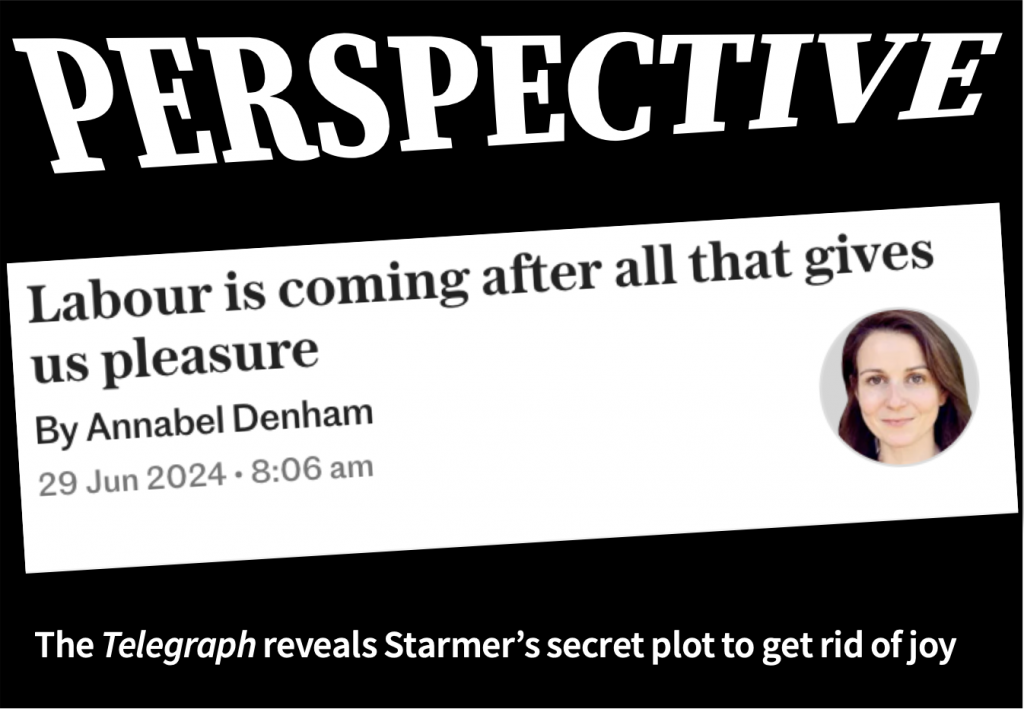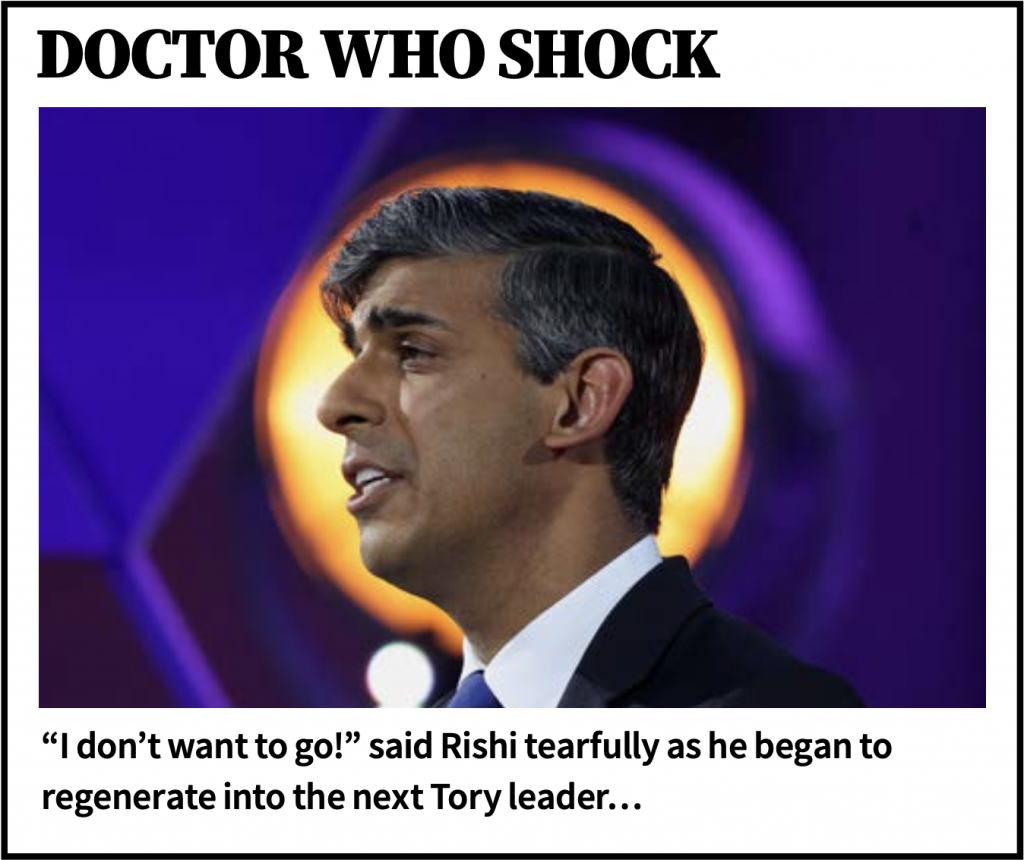Re: “From despair to where?” (TNE #394). I feel no particular sense of hope ahead of this election, only a searing rage at the last 14, indeed 40, wasted years.
There are actually good, hope-inducing things in Labour’s programme, particularly around climate, but I can’t help but feel that Keir Starmer’s experience is too meagre for the colossal task ahead.
Yasmin Ali
In the 50 years I have been involved in politics, I have never known an election that has so lacked excitement or engagement from the public.
Here in my part of County Durham, no one is talking about it, but many are actively avoiding listening just in case. I have seen just one political poster outside the local Labour councillor’s house in our village.
My postal vote went in last week – I come from a long Liberal tradition going back over a century, which is where my vote has gone again. Our campaign this time has at least highlighted a number of important issues that need to be tackled as a priority. With more MPs, these issues can and will be pursued going forward.
Generally, the smaller parties in the election have shown what might be done with a will and determination to think outside the box.
I will cheer loudly at the defeat the Tories know is coming. Yet I have long believed the two-party duopoly has been a major part of our problems. This is an opportunity for other political parties and ideas to emerge to fill the space.
David Rolfe

Big occasion, small party
Thank you Paul Mason for “A clear-eyed, detail-driven quiet revolution”, on Labour in power (TNE #394). I have waited, even yearned for the moment when a clear-headed Labour Party could earn the trust of the voting public and oust this appalling Tory wreck of a government.
Competence and realism is much needed today. If the result is as forecast, I can feel a huge celebratory party coming on although, in South Dorset, I don’t suppose there will be many attendees.
Trevor Newman
The securonomics Paul Mason writes about has much to recommend it, but alone it is not enough. A return to the single market (at least) is imperative, as is electoral reform.
Labour has not formed an “alliance” with the “small town social conservatives”, it has pandered to their prejudices. Proportional representation would reduce the power of this group and an improved economy would allay the fears of working-class manual labourers. All three are needed.
Starmerism without PR and single market access is Labour attempting national renewal with both hands tied behind its back.
Mark Grahame
May I thank Paul Mason for his clear explanation of Starmerism? May I unfortunately also express a whinge?
I am becoming very tired of hearing about “conservative-minded older people”. I am 88 and have never voted Conservative. In fact, I vote Green and find I am more concerned about the environment than many young people I know.
I’m sure I can’t be the only one. It only deepens prejudice not to qualify references to generational differences.
Dorothy Woolley
Newark on Trent, Nottinghamshire
Paul Mason has written a lot of sensible things over the months in TNE, but I shudder when he writes “Labour is the party of the unions”.
Just as big business tries to run the Tories for its own benefit, so the unions try to run Labour for their own benefit and not that of workers. How keen were the union bosses on joining the EU in the first place? How vocal were they in shouting for a Remain vote in the referendum? What the country needs are politicians who are NOT beholden to interest groups like big business CEOs and big union bosses, but parties who consult and listen to their individual members. In that respect, the Liberal Democrats are in a far better position than either Tories or Labour.
Malcolm Caporn
Aston on Trent, Derbyshire
Paul Mason claims “Labour’s vote, together with that of the Greens, SNP and Plaid Cymru, is piled up in the big cities.” I suspect it’s a long time since he looked at the electoral map of Wales.
In the 2019 election, Plaid won in the north, Ceredigion and Carmarthenshire. Fine areas, but not noted for possessing big cities. It is predicted that the results on July 4 will be much the same.
John Young
Usk, Monmouthshire
Hedging his bets
Re: Liz Gerard’s “A flutter into the gutter” (TNE #394). Perhaps Rishi Sunak’s reluctance to sack people who apparently used insider information to make money on the date of the election is that this is very similar to what a hedge fund manager does.
Hedge fund managers – Sunak was one from 2006 until becoming an MP in 2015 – have for some time been the royalty of the British economy, making vast personal fortunes while destroying individuals, firms and nations.
A question for the new government is whether we are prepared to continue to allow ourselves to be controlled by such self-centred, secretive people.
John Simpson
Ross on Wye, Herefordshire
Ex patriots
The campaign group Unlock Democracy wants parliamentary constituencies for British expatriates (Carousel, TNE #394).
Margaret Thatcher extended the right to vote in UK elections to expats who have been abroad for up to 15 years. The current government has extended this to a right to vote for life. It is no coincidence that both reforms were made by Conservative governments, because a majority of expats vote Tory (and also, paradoxically, support Brexit).
I wish to suggest that expats who have been out of the UK for more than five years (the maximum life of a UK parliament) should not have the right to vote in British elections.
Why should someone who pays no UK taxes, is not subject to British law, and in most cases has no intention of ever returning to this country, have a right to vote in our elections, which will determine the taxes that we do pay, and the laws that we must obey, for up to the next five years? They should apply instead for a vote in their chosen host country.
Chris Bliss-Jones
Luton, Bedfordshire
Balance sheet
Could your Scottish correspondent, Abigail King, show a little more balance? Her dislike of the SNP colours every report, including “Who is John Swinney?” (TNE #394).
The SNP is not trying to “hold together a failing coalition”. It abandoned it a couple of months ago, which led to the resignation of the then-first minister, Humza Yousaf.
Then there’s the hyperbole; “the party is in the thick of finance probes”. Fair enough, a former office holder has been charged with embezzlement, an allegation which the Crown Office has not, yet, agreed to test in court. No current office holders are involved nor any public money.
Dr Michael Lloyd
Dunbar, Scotland
I am a member of the SNP and have a great deal of respect for both the party and the man. We are used to the relentless criticism and smears from the right wing British media. Given that the SNP are committed to rejoining the EU when we regain our independence, I thought you would be a bit more supportive; sadly not.
Kate Doherty
Sartre’s stage act
Nigel Warburton’s analysis of Sartre and the waiter (TNE #393) seems a bit hard on Jean-Paul. It would be more accurate to bring a third person into the scenario described, someone with a view of both Sartre and the waiter.
This observer, given Sartre’s observations about the waiter, would probably agree that the latter’s actions are a performance, an act. But Sartre could justifiably claim that his own role is real, not an act, given that he’s not making any concessions to anyone else, not pretending to be what he is not; he’s just a miserable, grumpy and ungracious old git.
Then again, if the waiter were a professional actor could it be said he is authentically playing his part? “All the world’s a stage…”
Jeff Watkins
Press protection
On the TNE website, in “The real reason the press fear a Labour supermajority”, James Ball writes that, if “Starmer wins a majority of 218 or bigger”, he will have the power to amend the Royal Charter on the self-regulation of the press. He will not.
For any amendment to be made, the charter requires not only a two-thirds majority vote in the Commons, but additionally, a two-thirds majority vote in the Lords and the unanimous support of the Board of the Press Recognition Panel (PRP). Only 22% of peers eligible to vote in the House of Lords take the Labour whip; a proportion that will not be directly affected by the outcome of the general election. Members of the PRP board are apolitical.
As Ball observes, any government could enact primary legislation to introduce accountability for the press. But the Royal Charter system, based on the Leveson recommendations, is constitutionally immune to the whims and designs of the government of the day. It was developed to pass the test of time, and to protect press freedom and the public from wrongdoing regardless of who is in power at any particular time. That is why it has commanded the support of not only the victims of press abuse, but also press freedom advocates like Article 19 and the National Union of Journalists.
The Conservative press do not fear a supermajority (or else they would not have spent years campaigning against proportional representation, which would help prevent it). They fear a government that would put the public’s interests ahead of their own.
Nathan Sparkes CEO, Hacked Off
Delayed dilettante
Marie Le Conte used to pop up in your Carousel pages and I thought she was great. I was going to write in and ask why you didn’t give her her own column. I didn’t do that then, but now I see that you have (“Dilettante”). It’s brilliant, thank you.
Nigel Derby
Science fact
There is so much I enjoy about the New European: Charlie Connelly’s Great European Lives, the incisive analyses of Matthew d’Ancona, Jonty Bloom and Bonnie Greer as well as the regular columns by Nigel Warburton and Peter Trudgill.
However, I would suggest that a science column would be of real interest. Issues such as “what exactly is quantum entanglement?”, “why is time different at the top of a mountain than at sea level?”, “why do some neuroscientists say free will doesn’t exist?”, or, “what is the event horizon?”, among many others would, I imagine, be of interest to many of your readers.
In addition, such a column could explore the sometimes tense interface between science and other disciplines such as politics, sociology or the arts.
Graham Lee
Brighton, Sussex

BELOW THE LINE
Comments, conversation and correspondence from our online subscribers
Thank you Charlie Connelly for his lovely piece about Kathleen Jamie (“Poetry in Prose”, TNE #394). I know what you mean about wanting to keep her to yourself, but I have gifted more copies of her books than any other writer. She is truly unique and writes about life and the cracks in between in a way that always brings better understanding.
Sarah Lea
Re: Marie Le Conte on Westminster’s booze culture (Dilettante, TNE #394). I understand that parliament’s bars are heavily subsidised. How about charging top end London prices and giving the profits to a good cause? Buying wallpaper would not count.
Neil Townsend
Re: Bonnie Greer on received pronunciation (Vintage, TNE #394). Years ago, as a social worker, I started up an equality & diversity slot in our fortnightly team meetings. We looked at why Oxford English was preferred at the BBC and how people who had other accents were socially and economically disadvantaged. The next day the team manager, in her Oxford English accent, tore a strip off me for making this claim.
Gwynn Isaac
Re: “Britain is playing economic catch-up” by Jonty Bloom (TNE #394). This article gets to the heart of our economic problem: in particular, chronically inadequate investment in people and infrastructure; and short-termism by banks and politicians.
Some excellent solutions are proposed here, in particular, in my view, public investment benchmarks (with related accountability), and a green industrial strategy.
Anna Barnett
Re: “Bin fire of the vanities” (TNE #394). After the election the Tories will have to choose: move back to the centre ground, where elections are won, or swallow Reform. They can’t do both. At present Sunak is trying to satisfy both camps and pleasing neither. I’d say the Tories look like they’ll be heading ever further right.
Robin Prior
Re: Alastair Campbell’s Diary (TNE #394). Starmer’s EU stance needs crushing before it crushes us. It is inexcusable and inexplicable.
In 2018, there was a point to his Ming vase routine but not now. How can he claim to be a leader when he lets a shrinking minority control policy?
Lauren Smith
JOIN THE CONVERSATION
Subscribe and download our free new app to comment and chat with our writers



